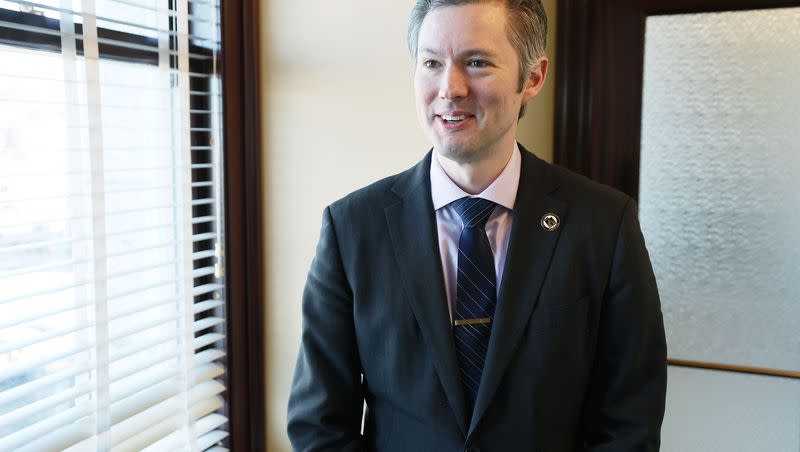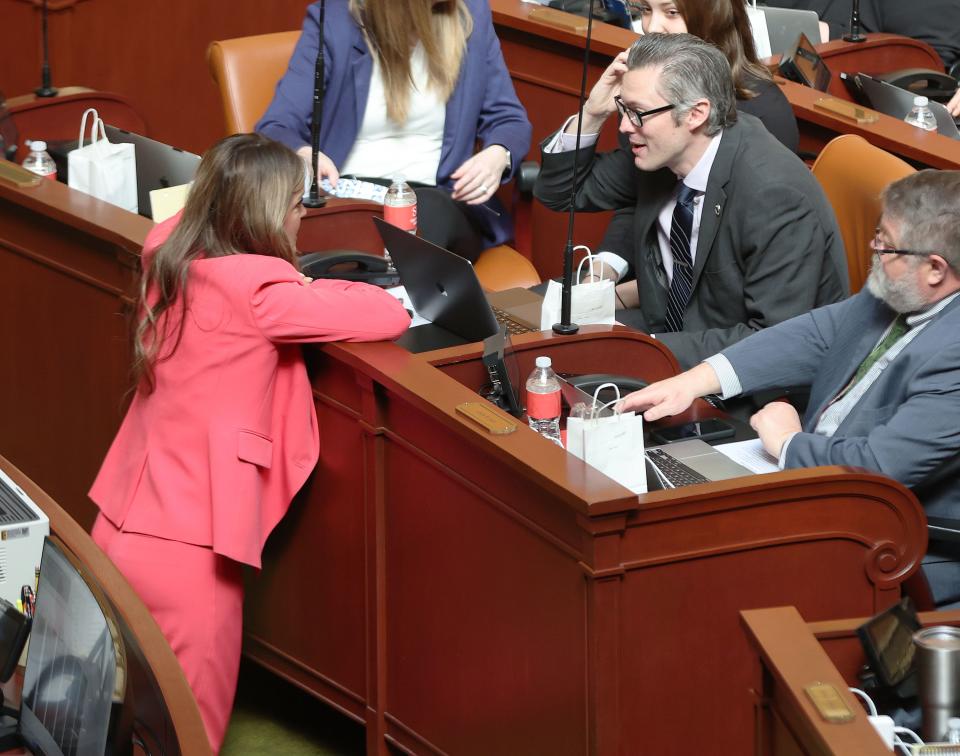Utah bill would allow clergy to report abuse or neglect

- Oops!Something went wrong.Please try again later.
- Oops!Something went wrong.Please try again later.
- Oops!Something went wrong.Please try again later.
A Utah legislator unveiled a proposal on Tuesday that he says strikes a balance between clergy-penitent privilege for religious confessions and the need to report suspected abuse.
The bill, HB432, introduced by freshman lawmaker Rep. Anthony Loubet, R-Kearns, and sponsored by Sen. Mike McKell, R-Spanish Fork, in the Senate, would amend the state’s child abuse reporting requirements to include legal protections for members of the clergy who report cases of ongoing abuse or neglect that were learned through a religious confession.
Currently, ordained religious officials, or clergy, are exempt from statutory requirements that mandate Utahns to immediately report suspected child abuse or neglect to child welfare services to a police officer. The reporting exemption for clergy members applies only if information regarding potential child abuse or neglect was shared by the perpetrator during a confession and the member of the clergy is bound to maintain confidentiality.
Will clergy be required to report on confessions?
Unlike past attempts to reform Utah’s clergy-penitent privilege laws, Loubet’s bill does not categorize clergy members as “mandatory reporters,” he said, because this designation could force some religious officials, such as Catholic priests and others, to choose between obeying the law and remaining in good standing with their faith.
Instead, the bill would extend to clergy members the same protections that exist for mandatory reporters against civil and criminal liability so that fear of a lawsuit coming from confessants is no longer an obstacle.
“It’s not requiring or mandating anybody to report,” Loubet told the Deseret News. “But it’s allowing members of the clergy to be able to report if they have reason to believe that child abuse or neglect is currently ongoing, even if the person confessed to them. And if they do, they receive the liability protections that any mandatory reporter would get.”
Based on conversations with other lawmakers, Loubet said he expects his bill to gain consensus among House and Senate members because it finds a “middle ground” that protects the obligations of ecclesiastical leadership while providing an incentive for institutions to change policies so that individual clergy members can alert law enforcement of criminal behavior affecting children without the threat of legal reprisal.
“And so I think that’s the biggest thing about this is that it’s trying to use the carrot approach to incentivize so we can start to be able to help these children,” Loubet said.

Why change clergy-penitent privilege laws?
Since entering office last year, several constituents have reached out to Loubet about reforming the state’s mandatory reporting exemption for clergy, he said.
“There’s been issues in the past where people have made allegations of members of the clergy knowing that they were being abused by parents or family members, and they felt nothing was being done,” Loubet said.
Efforts to end the state’s clergy exception were proposed in 2020 and 2023 by Utah Minority Leader Angela Romero, D-Salt Lake City. Neither made it out of the House Rules Committee. Legislative leadership said it didn’t want to force clergy members to choose between abiding by their faith and honoring the law.
“I don’t think I want to put clergy in a spot where they have to be excommunicated or thrown in jail. Those are the options and I don’t think that’s right,” Senate President Stuart Adams, R-Layton, said in 2023.
As the Deseret News has reported, several Christian faiths consider “sealed” confessional conversations a sacrament so important that a priest or pastor who reveals anything about a confession is removed or excommunicated.
In 2023, former House Speaker Brad Wilson also came out in opposition to Romero’s proposal, saying he would vote against the bill “unless significant changes are made to ensure the protection of religious liberties.”
Romero defended her bill at the time saying it did not target religious practice, but rather aimed at protecting victims of sexual abuse.
Studies on mandatory reporting, or removing clergy-pentitent exceptions, have failed to provide much evidence of effectiveness.
For example, a 2014 study specifically about mandatory clergy reporting of child maltreatment found that the number of reports from clergy in states mandating them was low. In fact, states that mandated reporting by religious leaders had 10% fewer confirmed reports of child maltreatment.
“Often, intensifying the mandatory character of the reporting requirements and making it more difficult for religious leaders to maintain confidentiality tends to be correlated, at least in some studies, with reduced reporting in the jurisdiction, and reduced effectiveness of reporting,” Brigham Young University law professor Cole Durham told the Deseret News.
Will Utah pass reforms to clergy-penitent privilege?
Rep. Brian King, D-Salt Lake City, introduced a similar piece of legislation to Loubet’s at the beginning of January. The two lawmakers were unaware of each others’ proposals being developed during the interim period in between legislative sessions, Loubet said.
King’s proposal, HB131, aims to clarify that clergy members “may” report suspected abuse, even if the information was received “from the confession of the perpetrator.”
King said his motivation was to make explicit that “Utah law is very clear in saying that you can’t be compelled to disclose information that’s provided to you by a confession. But it never states ... that you are prohibited legally from disclosing that information.”
He said he wanted to include language that would protect clergy members from civil liability to encourage them to come forward.
King’s bill has been with the House Rules Committee for two weeks and Loubet’s will be directed to the committee after it is presented to House members for an initial vote.
Both lawmakers said they worked with numerous stakeholders in the development of their proposals.
After the bill’s release Rabbi Avremi Zippel, the program director at Chabad Lubavitch of Utah, and a survivor of abuse, posted on social media, in relation to HB432, “such an honor to be involved in this process.”
According to a statement provided to KSL.com regarding HB432, “The Catholic Diocese of Salt Lake City does not oppose the bill regarding child abuse and neglect reporting that is being proposed ... as it is currently written.”
The statement continued: “We remain concerned about the possibility that the language could be changed to require that Catholic priests report such abuse even if they have learned about the abuse solely during the Sacrament of Confession. If this requirement were to become law, Catholic priests would face the untenable choice of breaking the law or being excommunicated.”
A spokesman for The Church of Jesus Christ of Latter-day Saints also said it is not opposed to Loubet’s bill in its current form.

